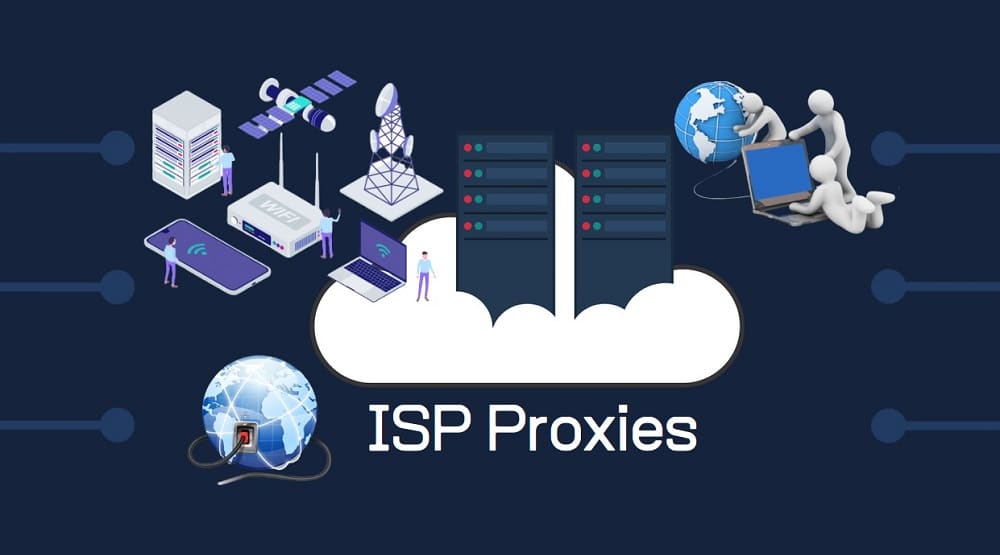You might be curious about how residential and ISP proxies compare, whether you're a novice or a seasoned proxy user. After all, both proxy kinds can mask your IP address.
What makes a difference, then? Why should you pick one over the other, exactly?
Keep reading on and you will understand all the basic aspects and details you need to know and figure out the key differences between Residential Proxies Vs ISP Proxies, and more!
Residential proxies are user devices with shifting IP addresses from all over the world. They serve as a link between you and the website where you are sending requests.

Leading home proxy providers have legal authorization to access peer devices.
Your internet traffic is routed through a residential device by a proxy server after being sent by residential proxies. The connection path so appears to be as follows: your device -> proxy server -> user's device -> web.
With residential proxies, people or businesses can pretend to be regular local internet users.
Large organizations may use this as a gateway to manage many accounts if they have digital assets above the platform's account limits.
Residential proxies come in a wide variety of regions and IP ranges because they are sourced from peer devices. Residential proxies are used by intelligence agencies to complete big data projects and validate data.
Websites with stringent security measuresInclude websites like Wayfair which are heavily scraped, shoe stores, and social media networks.
Location-sensitive tasksWhen working with many places simultaneously or viewing localized content (like city-level), residential proxies come in quite handy.
Ad verification
Advertisers examine if their adverts are displayed to the appropriate audience and in the proper context.
The most popular choice is residential proxies since they are difficult for fraudsters to ban and because they can be used in many different countries for targeted advertising.
SEO Monitoring

In order to watch local keyword ranks, investigate subjects, and assess competition, marketing agencies scrape Google and other search engines.
Travel fare aggregation
By scraping numerous sites, proxy-powered aggregators provide the greatest rates on hotels, flights, and other bargains. Residential proxies are quite anonymous, thus it can be difficult for websites to tell if someone is gathering data on them.
E-commerce intelligence
Residential proxies assist businesses in gaining knowledge from secure e-commerce sites like Amazon regarding product trends, positioning, and price adjustments.
IPs from service providers (such as Verizon) that are hosted in a data center are essentially what ISP proxies are.
These IPs appear more domestic than standard data center IPs, which enables them to function on more sites and also makes them more difficult to find and block. These sort of fill the gap between Resi Proxies and DCs perfectly.

They are assigned from Internet service providers, similar to ordinary residential proxies. ISP proxies don't rotate like typical residential nodes, which is one of their biggest distinctions in operation.
ISP proxies are a cross between a residential proxy and a proxy used in a data center.
You can experience increased speeds while making requests with ISP proxies that you might not experience with peer-sourced proxies because ISP proxies are disguised as data center IP addresses.
Individuals who are in charge of a sensitive account and want their IP address to remain static would value this feature.
You may also readBut, that does not guarantee that the proxies won't change. Even stationary residential proxies will eventually alter. ISP proxies could be an option if your use case necessitates the fastest connection feasible.
Include websites like Facebook, Instagram, etc.
Secure websites that call for a dependable identityISP proxies can be purchased by IP address. This implies that you won't be charged extra for unused bandwidth.
Traffic-intensive tasksInternet proxies are used by marketers to get over social media account restrictions and access the sites without problems from various regions.
Several e-commerce accounts on websites like Amazon are managed by merchants. Because they provide stable access to the same IP address, ISP proxies are excellent for this use case.
Multiple account managementSince many retailers experience bot problems, they have sophisticated defense measures in place. Internet proxies are frequently used for purchasing sneakers and other rare things because they are difficult to detect and have no traffic restrictions.
Residential proxy IPs are made up of a global network of genuine peers that voluntarily joined the network in exchange for payment (e.g., free premium membership to an application).
Large purchases of limited-edition itemsData retrieval times could be a little slower because residential data requests are routed through actual devices. Nonetheless, they nearly never get stopped, even when attempting to scrape extremely complex open-source websites.
Static residential proxies known as ISP proxies are purchased or rented from internet service providers (ISPs). Target sites recognize these IPs as actual users even if they are hosted by servers in data centers.
As there are fewer "hops" on the requested journey since requests are routed through a Data Center, data-gathering jobs can be finished more quickly than the industry standard.
Although ISP proxies are quicker, that does not guarantee that the quality will be as good when you check out. Residential proxies that rotate are the winner in this scenario since a wider IP pool typically indicates that the proxies aren't overused.
Before choosing a proxy type, you must always consider your use case. ISP proxies can be useful for your project if you want the fastest connection available and do not worry about IP diversity, but residential proxies can be unpredictable.
Rotating residential proxies is the winner in this situation since you require IP diversity if you wish to scale your data by making numerous requests.
Quick LinksUnlimited reliable proxies that can be used on practically any website are offered by residential proxies.
Home proxies use data plans and are slower than ISPs. ISP proxies are ideal in certain instances when a static connection is absolutely necessary, but dynamic residential proxies are better for many use cases.
ISP proxies offer higher consistency and faster speeds than residential proxies. ISPs, however, are more likely to be prohibited from most websites (except Yeezy Supply, Shopify, Footsite, etc.)
Moreover, ISPs are more expensive than Resis because they must be purchased in numbers rather than GBs, and they can be used for any amount of time (until they expire).
In order to answer the question "Which proxy network, should I use?," Examine the comparison table presented above and decide which features best meet your needs for a proxy server.
It is critical for an internet user or organization to comprehend the features and qualities of the proxy server.
You now understand the purpose of rotating home proxies and ISP proxies. You have all the data you require to determine which utility is most appropriate for your project.
Quick Links
